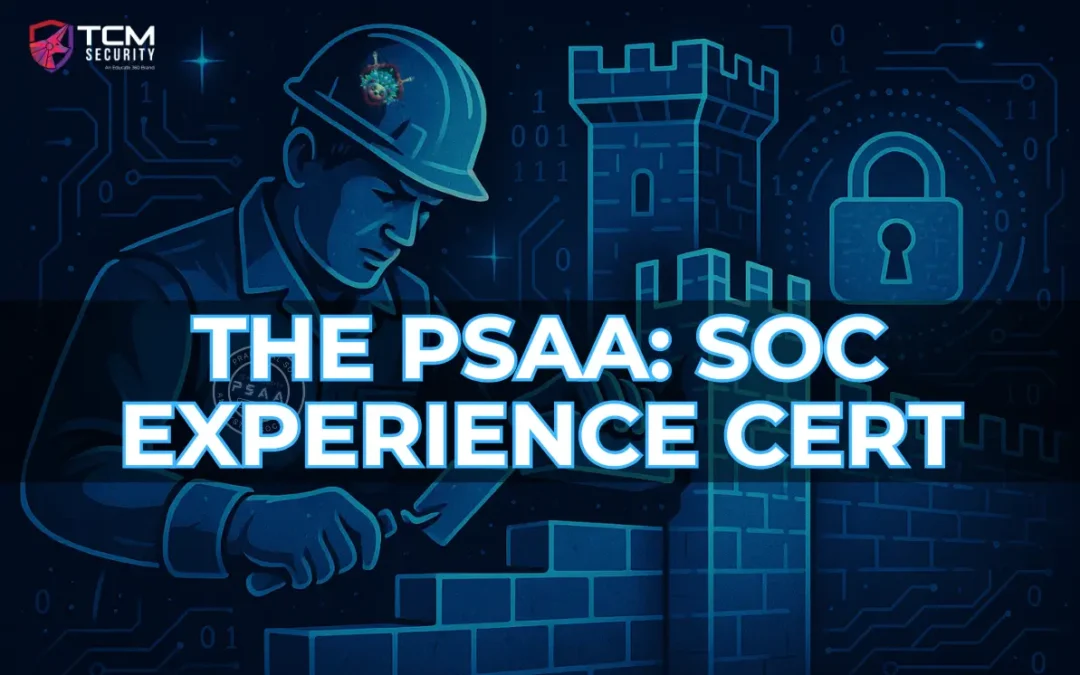On paper, or YouTube feeds, the cyber security job market looks like there’s endless demand for talent. In reality, the “entry-level” postings for SOC (Security Operations Center) analyst roles often expect experience that looks more like mid-level. The result: thousands of eager applicants all aiming for relatively few seats, and many hiring managers overwhelmed with resumes that all start to look the same.
This may sound discouraging, but there are ways to ease the journey and help yourself stand out. First off, defensive jobs are usually twice as plentiful as red team positions, so getting in through that avenue will almost certainly be easier. Also, the key is not just having knowledge, it’s proving you can do the job. That’s where a practical SOC certification, such as the Practical SOC Analyst Associate certification (PSAA), can come into play.
Let’s break down what makes a practical certification different, why it matters, and how it can help you both land the role and succeed on day one.
Knowledge vs. Day-One Readiness
Most people trying to break into cyber security start with free resources, video courses, or vendor certifications. These are great for learning terminology and theory, but they don’t necessarily prepare you for a shift in a SOC.
When an alert comes in, no one is asking you multiple-choice questions. You’re expected to triage, investigate, escalate, and document, all in real time and often with limited information. Employers know this, which is why “experience required” shows up in almost every posting. But if you don’t already work in a SOC, how do you get that experience?
That’s the gap the PSAA certification is designed to close.
What “Practical” Means
Unlike traditional certifications, a practical SOC analyst cert doesn’t test your ability to memorize facts or figures. Instead, it simulates the job by putting you into an environment as close to “real-world” as possible.
This means getting your hands on the keyboard and doing things like constructing ‘grep’ queries in a Linux CLI against a packet capture, looking at data to create an attack chain, and forming a hypothesis with evidence you’ve collected.
A knowledge-based exam is going to have a hard time validating those skills, and doesn’t require the training and preparation to take on the responsibilities of a security analyst.
The PSAA Exam Experience
The Practical SOC Analyst Associate certification is built around a live exam that feels like a shift in a SOC. You’re given a set of incidents to investigate over a 48-hour period, with another 48 hours afterward to write a report of the analysis that will be reviewed by a real person and eventually presented by you. Here is a brief breakdown of what is expected of a PSAA examinee:
- Make use of actual tools that a SOC Analyst uses daily, like SIEMs and EDRs, to identify Indicators of Compromise (IoC).
- Work through the methodology that a SOC Analyst would use to investigate and triage an alert.
- Track malicious activity across multiple data sources and gather evidence to support your hypothesis.
- Document the incident and present the report just as you would be expected/required to do in a professional setting.
This type of exam isn’t about whether you can name a protocol on a test. It’s about whether you can analyse and investigate a real-world cyber security incident and explain it clearly to others. Once certified, you can rest assured that you are equipped and ready to walk into a security analyst role and have the foundation to perform and succeed. Because you’ve demonstrated you can do that job.
Closing the Experience Gap
“X years of professional experience required.”
If seeing that phrase gave you a sudden wave of nausea, then you might be in the cyber security job market. If you are trying to break into cyber security, one of the hardest things to demonstrate is relevant experience. Hiring managers want to see that you’ve handled real incidents, but internships and junior roles are scarce.
The ‘chicken and egg’ problem of experience and jobs is especially tough for those who are just getting started, but one of the benefits of the PSAA is that the certification doesn’t just ‘certify’ you as being capable. Through the training and practice required to pass the exam, you’re gaining tangible experience in the duties that a SOC analyst performs daily.
Granted, this isn’t ‘paid’ experience, but it gives you a perspective with which to converse with industry professionals (or hiring managers) about the day-to-day of defensive cyber security. Listing your milestones reached during the training and the exam itself also makes for good resume bullet points.
A practical SOC certification gives you something concrete to talk about:
“Investigated and resolved simulated phishing, malware, and insider threat incidents using a SIEM and EDR.”
“Performed root cause analysis on endpoint and network data, producing executive summaries for stakeholders.”
These aren’t vague bullet points. They’re specific, measurable experiences you’ll gain through the cert. And when an interviewer asks, “Tell me about a time you investigated an alert,” you’ll actually have a story to tell.
Why It Matters to Hiring Managers
From the employer’s perspective, practical certifications reduce risk. A new hire with only knowledge might take weeks to become effective in a SOC, or the pressure of the real-time work might be too much, and they decide to pursue something else. A candidate who’s already practiced with real tools and methodology and demonstrated ability under a deadline can contribute faster.
In “hiring manager speak” that’s:
- Less onboarding time
- Fewer escalations for basic incidents
- Confidence that you can handle shift work without getting lost in the noise
In lieu of finding that unicorn internship or mythical ‘entry-level security analyst’ role, the PSAA provides a path for gaining walk-the-walk experience and a certification that says so. Being seen as someone who can get up to speed fast and is already tested in a SOC-like experience is something you want.
Why We Give You Two Exam Attempts
We offer two exam attempts when you purchase the PSAA exam voucher. There are two reasons for this. 1) We don’t profit from failure, whether it’s jitters, not taking the exam seriously, or just a bad day; you get two shots. And 2) it’s a difficult and largely unique experience the first time.
The format can be jarring for some who are used to multiple-choice exams or more gamified learning platforms. During the PSAA, you use real tools to investigate and analyse potential incidents and vulnerabilities to protect a network. We believe this work is important, and if you’re passionate about it, we want you to succeed without having to stress too much about your exam.
Skills You’ll Walk Away With
We like practicality at TCM. We strive to give you the information you need to know to accomplish the duties of whatever cyber discipline you are choosing to pursue and not bog you down with extraneous data. After that, we want you to ‘do’, and as a consequence, you gain and practice skills. To give you an idea of what a practical SOC analyst certification typically covers, here’s a list of skills you should have performed during prep and examination for the PSAA:
- Applied investigation methodologies and used tools to identify, analyze, and respond to realistic cyberattacks and incidents.
- Produced professionally reviewed incident reports documenting findings, investigation steps, indicators of compromise (IOCs), and recommended remediation actions.
- Conducted forensic analysis of network, endpoint, and log data to retrace attack paths and assess scope of compromise.
- Investigated and validated security alerts, user reports, and system artifacts to distinguish true threats from false positives.
- Utilized Security Information and Event Management (SIEM) platforms for log analysis.
- Performed phishing email analysis to identify malicious payloads and URLs.
- Executed network traffic analysis and network security monitoring to detect lateral movement, command-and-control activity, and data exfiltration attempts.
- Applied endpoint detection and response (EDR) tools for threat hunting, root cause analysis, and system remediation.
- Supported incident response by identifying IOCs and providing actionable recommendations to improve security posture.
- Gained hands-on experience in digital forensics to collect, preserve, and analyze evidence.
- Operated effectively in a Security Operations Center (SOC) environment, handling security scenarios based on real-world attack campaigns.
This isn’t an all-inclusive list, but it’s a strong foundation for anyone targeting Tier 1 or Tier 2 SOC analyst positions.
What to Look For in a Practical SOC Cert
Not all SOC certifications are created equal. If you’re evaluating options, here’s a quick checklist of what to look for:
- Hands-on lab exam (not multiple-choice)
- Realistic data sources (network logs, endpoint telemetry, etc)
- Incident reporting requirement (graded, with feedback)
- Live presentation or debrief
- Problem-solving emphasis (not rote memorization)
If a program offers these elements, it’s probably a solid choice.
Realistic Expectations
It’s worth noting that a certification, even a practical one, is by no means going to guarantee a job. You’ll still need to network, apply strategically, and continue learning. But what it will do is help bridge the gap between “enthusiastic learner” and “experienced candidate”, and that can make all the difference.
In Closing
There are many paths into cyber security, and everyone’s journey looks different. But at some point, you’ll need both knowledge and hands-on experience to move forward. The PSAA certification is designed to give you both, while signaling to employers that you can contribute on day one.
It’s not just about checking a box. It’s about proving, to yourself and to others, that you can do the job. Consider adding TCM’s Practical SOC Analyst Associate certification to your roadmap. It could be the bridge between where you are now and where you want to be.
Good luck out there.
About the Author: Josh Daniels
Josh is an avid storyteller and writer who loves learning about the behind-the-scenes of the digital world we live in. While his professional experience is in content marketing, Josh began pursuing a career in cybersecurity in 2022, gaining a Sec+ certificate along with other training from industry professionals and a life long learner attitude.
When he is not writing, Josh enjoys outdoor adventures with his family, watching movies, reading, and an unofficial (unpaid) side gig as a Game Master Consultant for several friends who play table top RPGs. At TCM, Josh has found a home where his passion for storytelling and cybersecurity meet.
“Once men turned their thinking over to machines in the hope that this would set them free. But that only permitted other men with machines to enslave them.”
– Frank Herbert
About TCM Security
TCM Security is a veteran-owned, cybersecurity services and education company founded in Charlotte, NC. Our services division has the mission of protecting people, sensitive data, and systems. With decades of combined experience, thousands of hours of practice, and core values from our time in service, we use our skill set to secure your environment. The TCM Security Academy is an educational platform dedicated to providing affordable, top-notch cybersecurity training to our individual students and corporate clients including both self-paced and instructor-led online courses as well as custom training solutions. We also provide several vendor-agnostic, practical hands-on certification exams to ensure proven job-ready skills to prospective employers. Pentest Services: https://tcm-sec.com/our-services/ Follow Us: Email List | LinkedIn | YouTube | Twitter | Facebook | Instagram | TikTok
Contact Us: [email protected]
See How We Can Secure Your Assets
Let’s talk about how TCM Security can solve your cybersecurity needs. Give us a call, send us an e-mail, or fill out the contact form below to get started.

